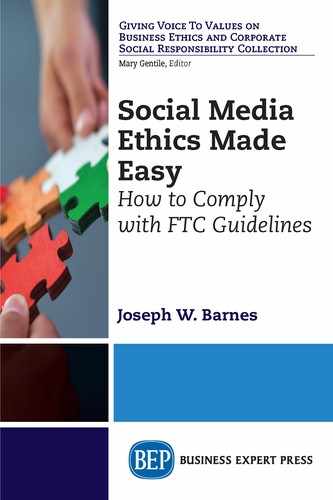Ethics is about doing the right thing, but in today’s digital world, doing what’s right is not always clear, especially from workplace to workplace, organization to organization, and so on. That is why it is so important to define ethics in this book, and in your organization.
Even the prestigious Ethics Resources Center acknowledges the challenge of defining “ethics.”
“Even among those who believe they know ethics, there is not total agreement on the meaning of the terms that are used. For many, a particular definition is a function of the academic discipline that shaped one’s thinking and the religious, theological or philosophical underpinnings of one’s personal belief system. For others, there may be a usage that is specific to their individual area of work or study.” (Ethics.org 2009)
The Ethics Resources Center proposes this definition: “The decisions, choices, and actions (behaviors) we make that reflect and enact our values.” (Ethics.org 2009)
In the social/digital/mobile world, it is about creating social media ethics policies, upholding policies that every business and organization should put in place, being honest, and disclosing relationships such as who you work for in personal posts when endorsing products and services, and not writing fake reviews.
As we will explore throughout this book, much of the social media ethical issues surround posts related to work.
The National Business Ethics Survey (NBES) (Ethics.org 2013) surveyed employees nationwide about social media; the findings are quite revealing.
• More than 1 in 10 employees are “Active Social Networkers” (ASNs) who spend at least 30 percent of their workday linked up to one or more networks.
• Nearly 3 out of 4 social networkers (72 percent) say they spend at least some time on their social networks during every workday, and almost 3 in 10 (28 percent) say such activity adds up to an hour or more of each day they spend at work. Very little of the online time is work related.
• Social networkers are clearly breaking old barriers and talking more freely than ever before about their jobs and their company.
• 6 of 10 ASNs would comment on their personal sites about their company if it was in the news, 53 percent say they share information about work projects once a week or more, and more than a third say they often comment, on their personal sites, about managers, coworkers, and even clients. As a result, workplace “secrets” are no longer secrets, and management must assume that anything that happens at work, that is any new policy, product, or problem, could become publicly known at almost any time.
Mary C. Gentile, Ph.D., author of Giving Voice to Values, Director of the Giving Voice to Values curriculum, and senior research scholar at Babson College explains it this way:
“The challenge appears to be not just one of recognizing ethical issues when they arise or learning to think them through—we are all practiced from toddler age with the skill of generating rationalizations for our choices. The challenge, rather, appears to be one of preparing for action: what do you do and say once you know what you think is right?” (Gentile 2010)
As you read this book, it’s important to think critically about ethics issues that have arisen in social media and to think about issues that may come up in the future. One group that studies ethics is the Markkula Center for Applied Ethics at Santa Clara University. The experts there pose some interesting questions for all of us to think about. These questions cover areas such as the utilitarian perspective, rights perspective, fairness perspective, and a common good perspective.
• “Do social networkers have a right to privacy?”
• “More and more users of Facebook are finding that prospective employers are perusing their sites, despite the fact that they may conceive of their online presence as personal space.” Is this practice ethical?
• “What is a private person’s right to control the images and information about them available on line?”
• Are there ways to structure online communities so that they better promote the common good of their members?
Summary
In this chapter, we have learned that ethics is about doing what is right. In social media, this means disclosing whom you work for in personal posts, about the products or services you have a direct connection with. If you are employed by X company, it’s important to say that when writing a glowing post so readers understand the context.
Finally, we learned never to post or participate in any fake reviews.
